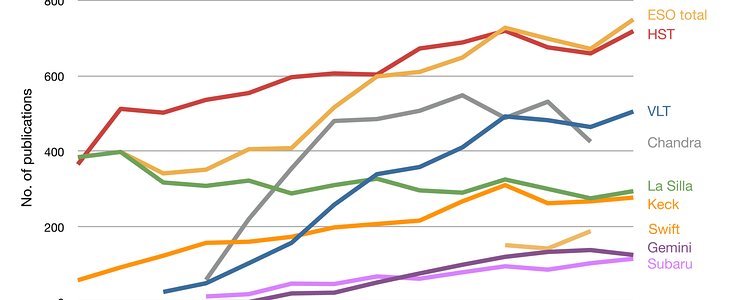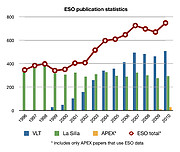Tiedote
ESO — World’s Most Productive Observatory for the Fourth Year
Survey of astronomy journals shows 2010 to be most productive year yet for ESO and its user community
28. maaliskuuta 2011
A survey of scientific journals has shown that 2010 was the most productive year in ESO’s history. The ESO user community, using data from ESO telescopes, published more than 750 peer-reviewed papers. For the fourth year in a row, ESO is the most productive astronomical observatory in the world in terms of number of publications from its users.
Counting the number of articles that are based on data from an observatory’s telescopes is an important indicator of how productive it is. As such, it is common practice for organisations like ESO to carry out regular reviews to determine their scientific productivity. ESO’s annual survey of the major scientific journals shows that, with a haul of more than 750 peer-reviewed papers published in 2010 by the ESO community, using data from ESO telescopes, the observatory has broken its previous record set in 2007.
Every observatory uses slightly different methods to measure these figures (for example, searching different collections of journals), meaning they cannot always be compared exactly. However, with a publication haul slightly ahead of the NASA/ESA Hubble Space Telescope, and far ahead of any other ground-based observatory, these figures are unambiguous: ESO and its user community is a scientific powerhouse, making a major contribution to astronomy. It is the fourth successive year that ESO has had the largest number of publications of any observatory on or above the Earth.
Even taken separately, ESO’s sites at Paranal and La Silla individually outperform all other observatories on the ground. For the first time, over 500 papers were credited to Paranal alone, while La Silla shows a publication record of just under 300, in line with previous years, as would be expected from a mature, well-functioning scientific facility [1].
After the recent accession of Brazil, the ESO community now includes about one third of the world’s astronomers [2]. In addition the Very Large Telescope at ESO’s Paranal Observatory reached its full instrument complement some years ago and is now a mature observatory. These factors go some way to explaining the pre-eminence of ESO at this point.
These publication statistics give an idea of how much scientific work gets done with data from the individual observatories, but does not address the impact of this science. A study of the citation rates for articles, which measures how influential scientific results are, is planned to answer this question.
Notes
[1] The data show a total of 751 papers, made up of 507 based on Paranal data, 296 based on La Silla data and 29 on APEX data. Some papers include data from more than one ESO site and are counted only once in the total figure, hence the total number is slightly lower than the sum of the three observatory totals.
[2] This figure is based on the number of members of the International Astronomical Union (IAU) in different countries.
More Information
This research was carried out by the ESO Library. The methodology is discussed in the document “ESO Publication Statistics”, available from the Library’s website (http://www.eso.org/libraries/) and via the PDF link below.
Linkit
Yhteystiedot
Uta Grothkopf
ESO Librarian
Garching bei München, Germany
Tel: +49 89 3200 6280
Email: esolib@eso.org
Lars Lindberg Christensen
Head of ESO ePOD
ESO ePOD, Garching, Germany
Tel: +49 89 3200 6761
Cellular: +49-173-3872-621
E-mail: lars@eso.org
Tiedotteesta
| Tunnistus: | ann11011 |
Our use of Cookies
We use cookies that are essential for accessing our websites and using our services. We also use cookies to analyse, measure and improve our websites’ performance, to enable content sharing via social media and to display media content hosted on third-party platforms.
ESO Cookies Policy
The European Organisation for Astronomical Research in the Southern Hemisphere (ESO) is the pre-eminent intergovernmental science and technology organisation in astronomy. It carries out an ambitious programme focused on the design, construction and operation of powerful ground-based observing facilities for astronomy.
This Cookies Policy is intended to provide clarity by outlining the cookies used on the ESO public websites, their functions, the options you have for controlling them, and the ways you can contact us for additional details.
What are cookies?
Cookies are small pieces of data stored on your device by websites you visit. They serve various purposes, such as remembering login credentials and preferences and enhance your browsing experience.
Categories of cookies we use
Essential cookies (always active): These cookies are strictly necessary for the proper functioning of our website. Without these cookies, the website cannot operate correctly, and certain services, such as logging in or accessing secure areas, may not be available; because they are essential for the website’s operation, they cannot be disabled.
Functional Cookies: These cookies enhance your browsing experience by enabling additional features and personalization, such as remembering your preferences and settings. While not strictly necessary for the website to function, they improve usability and convenience; these cookies are only placed if you provide your consent.
Analytics cookies: These cookies collect information about how visitors interact with our website, such as which pages are visited most often and how users navigate the site. This data helps us improve website performance, optimize content, and enhance the user experience; these cookies are only placed if you provide your consent. We use the following analytics cookies.
Matomo Cookies:
This website uses Matomo (formerly Piwik), an open source software which enables the statistical analysis of website visits. Matomo uses cookies (text files) which are saved on your computer and which allow us to analyze how you use our website. The website user information generated by the cookies will only be saved on the servers of our IT Department. We use this information to analyze www.eso.org visits and to prepare reports on website activities. These data will not be disclosed to third parties.
On behalf of ESO, Matomo will use this information for the purpose of evaluating your use of the website, compiling reports on website activity and providing other services relating to website activity and internet usage.
Matomo cookies settings:
Additional Third-party cookies on ESO websites: some of our pages display content from external providers, e.g. YouTube.
Such third-party services are outside of ESO control and may, at any time, change their terms of service, use of cookies, etc.
YouTube: Some videos on the ESO website are embedded from ESO’s official YouTube channel. We have enabled YouTube’s privacy-enhanced mode, meaning that no cookies are set unless the user actively clicks on the video to play it. Additionally, in this mode, YouTube does not store any personally identifiable cookie data for embedded video playbacks. For more details, please refer to YouTube’s embedding videos information page.
Cookies can also be classified based on the following elements.
Regarding the domain, there are:
- First-party cookies, set by the website you are currently visiting. They are stored by the same domain that you are browsing and are used to enhance your experience on that site;
- Third-party cookies, set by a domain other than the one you are currently visiting.
As for their duration, cookies can be:
- Browser-session cookies, which are deleted when the user closes the browser;
- Stored cookies, which stay on the user's device for a predetermined period of time.
How to manage cookies
Cookie settings: You can modify your cookie choices for the ESO webpages at any time by clicking on the link Cookie settings at the bottom of any page.
In your browser: If you wish to delete cookies or instruct your browser to delete or block cookies by default, please visit the help pages of your browser:
Please be aware that if you delete or decline cookies, certain functionalities of our website may be not be available and your browsing experience may be affected.
You can set most browsers to prevent any cookies being placed on your device, but you may then have to manually adjust some preferences every time you visit a site/page. And some services and functionalities may not work properly at all (e.g. profile logging-in, shop check out).
Updates to the ESO Cookies Policy
The ESO Cookies Policy may be subject to future updates, which will be made available on this page.
Additional information
For any queries related to cookies, please contact: pdprATesoDOTorg.
As ESO public webpages are managed by our Department of Communication, your questions will be dealt with the support of the said Department.


